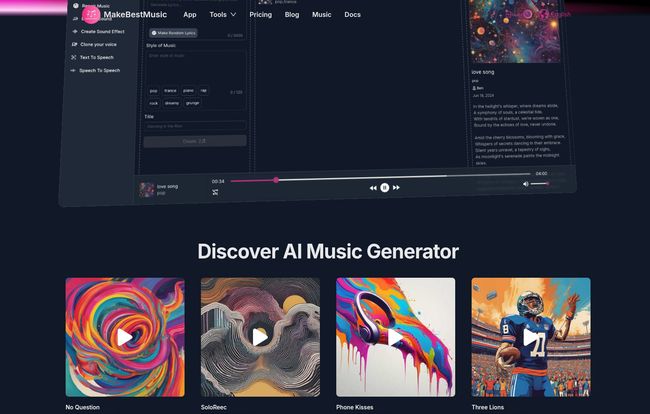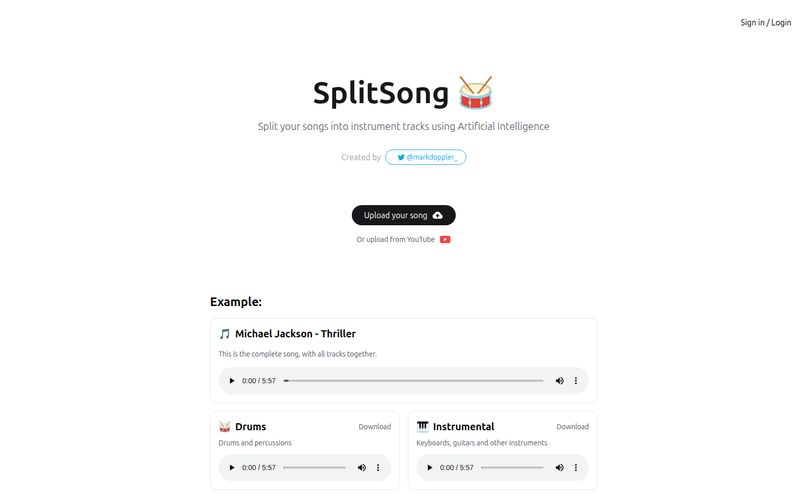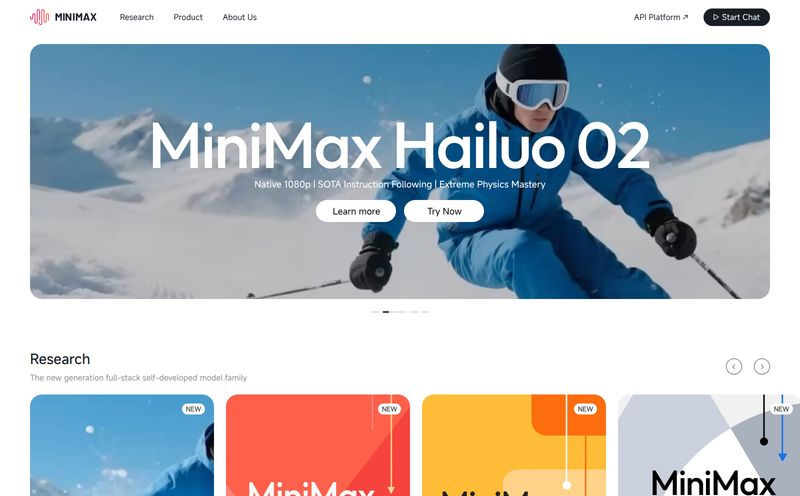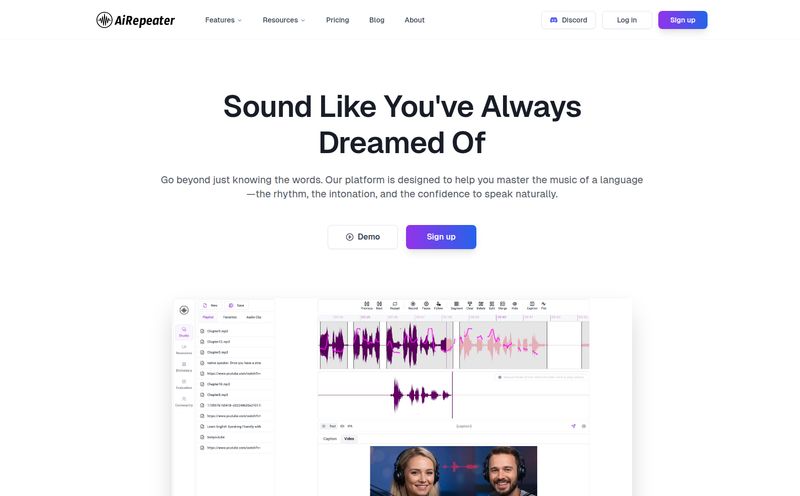If you’re a content creator, a marketer, or an indie dev, you’ve been there. You’re deep in the creative zone, your project is almost perfect, and all you need is that one final piece: the music.
So you descend into the ninth circle of hell, otherwise known as a generic stock music library. You type in “upbeat corporate” and are assaulted by a thousand nearly-identical ukulele tracks. You search for “dramatic cinematic” and find scores so over-the-top they’d make Hans Zimmer blush. It’s a soul-crushing, time-sucking process. We’ve all lost hours, if not days, to this quest. I know I have.
But what if you could just… ask for the music you want? Like, literally describe it and have it appear, ready to go? This isn’t some far-off sci-fi fantasy anymore. This is the reality of AI music generation, and I’ve been putting a new platform, MakeBestMusic.com, through its paces. And frankly, I'm pretty impressed.
So, What Exactly is MakeBestMusic?
Think of it as having a personal composer on speed dial, 24/7. But instead of sending a complicated creative brief, you just type a few words into a box. MakeBestMusic is an AI-powered platform designed to create original, studio-quality music from simple text prompts. You can type in something like, “A chill, lo-fi hip hop beat with a gentle piano melody, perfect for a rainy day study session,” and in moments, the AI spits out a track for you. It’s pretty wild.
But it's not just a one-trick pony. The platform is building out a whole suite of tools aimed at taking the friction out of audio production. It's one of those things that, once you use it, you wonder how you ever put up with the old way of doing things.

Visit MakeBestMusic
The Features That Actually Matter
A lot of AI tools love to list a million features to look impressive, but only a few are genuinely useful. I dug into what MakeBestMusic offers to see what was killer and what was just filler. It's more than just a simple generator.
The Main Event: Text-to-Music Generation
This is the star of the show, no doubt. The ability to generate music from a description is the core appeal. I found that the quality of the output is directly tied to the quality of your input. My first few attempts were a bit vague, and the results were… well, let's call them creatively abstract. But once I got specific—mentioning genre, mood, instruments, and even tempo—the results got so much better. It's a skill, like learning how to talk to a new team member. A little bit of prompt engineering goes a long way here.
More Than a Composer: The AI Toolkit
This is where I think MakeBestMusic starts to pull away from the pack. It isn't just about creating tracks from scratch. It’s about manipulating audio in ways that used to require expensive software and a ton of know-how.
For instance, the AI Music Splitting tool is brilliant. Ever found a great track but only wanted the drum line or the bass groove? This feature acts like an audio scalpel, letting you isolate specific stems from a song. For sampling, remixing, or just deconstructing a piece to see how it works, this is incredibly powerful.
Then there’s the AI Singing Generator (which their site charmingly lists as “conver voice” in one spot, a little typo that reminds you there are humans behind this!). This lets you transform voices, which is a bit of a niche tool but can be a blast for experimental music or unique content. Paired with the AI Music Remixing, you've got a genuine creative playground at your fingertips.
Who Is This AI Music Tool Really For?
I can see a few groups getting a massive amount of value from this. It's not just for one type of user.
- YouTube Creators & Podcasters: This is the most obvious win. Imagine having a completely unique, custom-made intro, outro, and background music for every single video or episode. The best part? No more dreaded YouTube Content ID claims or copyright strikes. That peace of mind alone is worth a subscription.
- Indie Game Developers: Custom soundtracks are expensive and time-consuming. For a small studio or solo dev, being able to generate dozens of atmospheric tracks for different levels or moods could be a total game-changer, freeing up budget for other parts of the game.
- Musicians and Producers: Some might see AI as a threat, but I see it differently. I've always felt that the best tools don't replace creativity; they fuel it. Use it to break a creative block. Generate a weird chord progression or a unique drum pattern to build a song around. It’s not your replacement; it’s your new brainstorming partner.
Let's Talk Money: The MakeBestMusic Pricing Breakdown
Alright, the all-important question: what does it cost? The pricing structure is pretty straightforward, following a classic tiered SaaS model based on credits and features. A “credit” is basically a token to generate one piece of music.
| Plan | Price | Key Features |
|---|---|---|
| Free | $0 /month | 3 AI music credits. A good way to test the waters. |
| Basic | $14.90 /month | 200 credits/month, Text to Music, commercial use license. |
| Standard | $29.90 /month | 600 credits/month, adds Singing Generator, Music Splitter, High-Quality Exports, 1000 downloads. |
| Professional | $129.80 /month | Unlimited credits & downloads, all features included. For agencies or power-producers. |
The Standard plan seems to be the sweet spot for most serious creators, offering a generous number of credits and all the cool toys. But the most important feature across all paid plans is the commercial use license and the fact that you get copyright ownership of the songs you create. This can not be overstated. It’s the difference between licensing a track and truly owning it.
The Good, The Bad, and The AI-Generated
No tool is perfect, right? After spending some time with it, here's my honest take.
The upsides are huge. It's incredibly easy to get started, you get full commercial rights to the music, and the audio quality on the paid plans (offering WAV exports) is top-notch. The freedom from copyright anxiety is a massive weight off any creator's shoulders. That alone is a selling point.
On the flip side, the credit system, while common, can feel a bit restrictive if you're a tinkerer who wants to generate 50 versions of an idea. You have to be a bit more deliberate with your generations. Also, as I mentioned, the quality of the music is very dependent on the quality of your prompt. You can't just be lazy and expect a masterpiece. There's a learning curve to figuring out how to prompt the AI for the best results. Don't be discouraged if you're first few creations are a bit… meh.
Frequently Asked Questions
Here are some of the questions that popped into my head while using the platform.
- Can I really use the music I make on YouTube and Spotify?
- Yes! With a paid subscription, you get a professional PDF license for commercial use and own the copyright. This means you can monetize it on YouTube, use it in ads, or even upload it to streaming services without worry.
- Do I need to be a musician to use MakeBestMusic?
- Absolutely not. In fact, that's kind of the whole point. If you can describe the music you want in words, you can use this tool. No music theory required.
- What is an 'AI music credit'?
- Think of it as a token. Typically, one credit allows you to generate one piece of music. Your credits refresh each month depending on your plan.
- What happens to my music if I cancel my subscription?
- Generally with platforms like this, you retain the rights to the music you created and downloaded while your subscription was active. You just lose the ability to create new tracks. I'd always recommend double-checking the platform's specific terms, of course.
- Is the AI-generated music truly unique?
- Yes, for the most part. The AI is generating a new composition based on your unique prompt and its vast training data. The odds of it creating the exact same track as someone else are astronomically low, especially with detailed prompts.
- How good is the audio quality?
- The paid plans offer high-quality exports like WAV, which is a lossless format perfect for professional video and audio production. The free plan will likely give you a standard MP3, which is fine for previews.
Is AI Music the Future?
Look, I'm an SEO guy who's been around the block. I've seen countless tools and trends come and go. But AI music generation doesn’t feel like a gimmick. It feels like a genuine shift in how we create. Tools like MakeBestMusic.com are democratizing music creation, taking it out of the hands of a select few and giving it to anyone with an idea.
It's not about putting composers out of a job. It's about giving creators, developers, and marketers a powerful new tool in their arsenal. It's about saving time, eliminating legal headaches, and unlocking a new level of creative specificity. For me, the days of scrolling through endless, soulless stock music libraries are over. And I'm not looking back.



